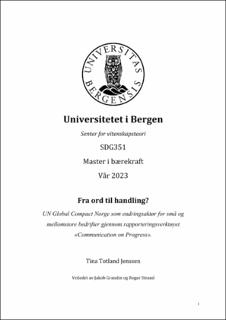Fra ord til handling? UN Global Compact Norge som endringsaktør for små og mellomstore bedrifter gjennom rapporteringsverktøyet «Communication on Progress».
Master thesis
Permanent lenke
https://hdl.handle.net/11250/3072813Utgivelsesdato
2023-05-15Metadata
Vis full innførselSamlinger
Sammendrag
Businesses are expected to be responsible in terms of social, environmental and economic sustainability. They are increasingly met with expectations from stakeholders and demands to report on their impact and advances, but this mainly applies to larger companies. However big their collective impact, small and medium sized enterprises (SMEs) have mostly been exempted from such demands. This is now expected to change, and calls to report may reach Norwegian SMEs in the foreseeable future. United Nations Global Compact (UNGC) is a member-based initiative of the UN, working as a change agent together with businesses to achieve common goals for sustainable and responsible business. Annually, all members submit UNGCs sustainability report, the «Communication on Progress» (CoP). Their member base largely consists of SMEs, giving the initiative the unique aspect of SMEs, a group otherwise lagging in the sustainable shift and largely exempt from these demands, having voluntarily committed to sustainability reporting. This thesis is based on an internship at UNGCs network in Norway (UNGCN). Through a qualitative case study, this thesis aims to contribute to sustainability science, and the Social Environmental Accounting (SEA) and Corporate Social Responsibility (CSR) literature by exploring the following research questions: How does UN Global Compact Norway function as a change agent for small and medium-sized enterprises (SMEs) through their sustainability reporting tool «Communication on Progress» (CoP)? 1. What are the challenges, opportunities and experiences faced by SME-members of the UN Global Compact Norway using CoP? 2. What is the relation between the use of CoP as an external tool for sustainability reporting, and the internal sustainability work of the SME-members? The study concludes that UNGCN as an external change agent succeeds in getting more SMEs to commit and report on sustainability, through shared ambitions, providing CoP as a manageable reporting tool and promoting business opportunities by doing so. As the SME- members are already focused on sustainability, the results do not credit UNGCN with «creating» more responsible SMEs. Still, the sum of member commitments and actions may lead to positive effects, and CoP seems to help SMEs identify areas for improvement and where to focus their sustainability efforts. The findings indicate a weak link between CoP and actual sustainability efforts or results in the SMEs. However, the results may be limited by the sample size and the fact that the participating SMEs have only submitted CoP a few times.
